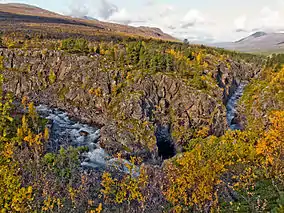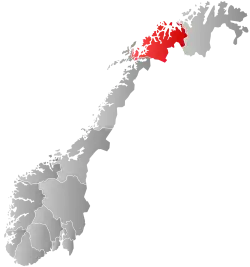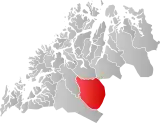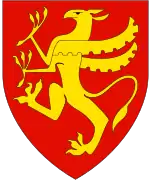Øverbygd Municipality
Øverbygd herred | |
|---|---|
 View of the Øvre Dividal park in Øverbygd | |
 Troms within Norway | |
 Øverbygd within Troms | |
| Coordinates: 69°01′27″N 19°17′45″E / 69.02417°N 19.29583°E | |
| Country | Norway |
| County | Troms |
| District | Hålogaland |
| Established | 1 July 1925 |
| • Preceded by | Målselv Municipality |
| Disestablished | 1 Jan 1964 |
| • Succeeded by | Målselv Municipality |
| Administrative centre | Skjold |
| Area (upon dissolution) | |
| • Total | 2,132 km2 (823 sq mi) |
| Population (1964) | |
| • Total | 1,232 |
| • Density | 0.58/km2 (1.5/sq mi) |
| Demonym | Øverbygding[1] |
| Time zone | UTC+01:00 (CET) |
| • Summer (DST) | UTC+02:00 (CEST) |
| ISO 3166 code | NO-1923[2] |
Øverbygd is a former municipality in Troms county in Norway. The 2,152-square-kilometre (831 sq mi) municipality existed from 1925 until its dissolution in 1964. It was located in what is now the eastern part of Målselv Municipality, stretching from the border with Sweden in the east, through the Dividalen and Rostadalen valleys to the Målselva river and the eastern part of the Målselvdalen valley. The administrative centre was the village of Skjold. Skjold was the site of the local church, Øverbygd Church as well as home to a large garrison for the Norwegian Army. Øvre Dividal National Park made up a large part of the southeastern part of the municipality.[3]
Dividalen is used as a setting in TV drama Outlier (2020).[4][5]
History
The municipality of Øverbygd was established on 1 July 1925 when Målselv Municipality was divided into two municipalities: Målselv in the west and Øverbygd in the east. Initially, Øverbygd had a population of 566 inhabitants. During the 1960s, there were many municipal mergers across Norway due to the work of the Schei Committee. On 1 January 1964, Øverbygd municipality (population: 1,232) was merged with all of the municipality of Målselv (population: 5,584), the Naveren and Målsnes areas of Malangen municipality (population: 118), and the Skogli ved Heia farm (population: 2) from Balsfjord municipality to form a new, larger Målselv Municipality.[3][6]
World War II
During World War II, the German army created a military base at Øverbygd. The base was initially a supply point for the German forces attack on Murmansk. German soldiers on retreat at the end of the war came through Øverbygd. Maukstadmoen and Holmen were undeveloped pine forests, but virtually all of the commercial forest was cut down to provide German troops land and building materials.
Large barracks for the officer's quarters were established on Maukstadmoen. They also built large stock barracks, a cold storage plant, and a German military hospital. A Prisoner-of-war camp for Russian prisoners of war and medical camp was built near Holmen.
Government
During its existence, this municipality was governed by a municipal council of directly elected representatives. The mayor was indirectly elected by a vote of the municipal council.[7]
Municipal council
The municipal council (Kommunestyre) of Øverbygd was made up of 13 representatives that were elected to four year terms. The party breakdown of the final municipal council was as follows:
| Party name (in Norwegian) | Number of representatives | |
|---|---|---|
| Labour Party (Arbeiderpartiet) | 3 | |
| Conservative Party (Høyre) | 4 | |
| Local List(s) (Lokale lister) | 6 | |
| Total number of members: | 13 | |
| Party name (in Norwegian) | Number of representatives | |
|---|---|---|
| Local List(s) (Lokale lister) | 13 | |
| Total number of members: | 13 | |
| Party name (in Norwegian) | Number of representatives | |
|---|---|---|
| Local List(s) (Lokale lister) | 12 | |
| Total number of members: | 12 | |
| Party name (in Norwegian) | Number of representatives | |
|---|---|---|
| Local List(s) (Lokale lister) | 12 | |
| Total number of members: | 12 | |
| Party name (in Norwegian) | Number of representatives | |
|---|---|---|
| Local List(s) (Lokale lister) | 12 | |
| Total number of members: | 12 | |
| Party name (in Norwegian) | Number of representatives | |
|---|---|---|
| Local List(s) (Lokale lister) | 12 | |
| Total number of members: | 12 | |
| Note: Due to the German occupation of Norway during World War II, no elections were held for new municipal councils until after the war ended in 1945. | ||
References
- ↑ "Navn på steder og personer: Innbyggjarnamn" (in Norwegian). Språkrådet.
- ↑ Bolstad, Erik; Thorsnæs, Geir, eds. (26 January 2023). "Kommunenummer". Store norske leksikon (in Norwegian). Kunnskapsforlaget.
- 1 2 Thorsnæs, Geir, ed. (18 June 2018). "Øverbygd – tidligere kommune". Store norske leksikon (in Norwegian). Kunnskapsforlaget. Retrieved 1 August 2018.
- ↑ Keslassy, Elsa (15 June 2020). "Reinvent Kicks Off Pre-Sales on Hot New Scandi Drama Outlier". Variety. Retrieved 26 October 2021.
- ↑ Gunleik (26 November 2020). "Shuuto Arctic: Outlier - 'Here's to the crazy ones...'". Quine. Retrieved 26 October 2021.
- ↑ Jukvam, Dag (1999). "Historisk oversikt over endringer i kommune- og fylkesinndelingen" (PDF) (in Norwegian). Statistisk sentralbyrå. ISBN 9788253746845.
- ↑ Hansen, Tore; Vabo, Signy Irene, eds. (20 September 2022). "kommunestyre". Store norske leksikon (in Norwegian). Kunnskapsforlaget. Retrieved 1 January 2023.
- ↑ "Kommunevalgene og Ordførervalgene 1959" (PDF) (in Norwegian). Oslo: Statistisk sentralbyrå. 1960. Retrieved 18 March 2020.
- ↑ "Kommunevalgene og Ordførervalgene 1955" (PDF) (in Norwegian). Oslo: Statistisk sentralbyrå. 1957. Retrieved 18 March 2020.
- ↑ "Kommunevalgene og Ordførervalgene 1951" (PDF) (in Norwegian). Oslo: Statistisk sentralbyrå. 1952. Retrieved 18 March 2020.
- ↑ "Kommunevalgene og Ordførervalgene 1947" (PDF) (in Norwegian). Oslo: Statistisk sentralbyrå. 1948. Retrieved 18 March 2020.
- ↑ "Kommunevalgene og Ordførervalgene 1945" (PDF) (in Norwegian). Oslo: Statistisk sentralbyrå. 1947. Retrieved 18 March 2020.
- ↑ "Kommunevalgene og Ordførervalgene 1937" (PDF) (in Norwegian). Oslo: Statistisk sentralbyrå. 1938. Retrieved 18 March 2020.
External links
 Troms travel guide from Wikivoyage
Troms travel guide from Wikivoyage
